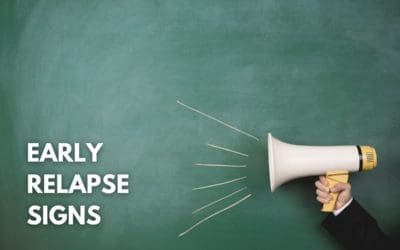Despite the fact that millions upon millions will face addiction sometime in their lives, only a fraction (about 10%) will ever seek addiction treatment. Among this fraction, only a certain percentage will successfully complete rehab and be clean.
Many people are under the misconception that they can breathe easy once a family member or friend has completed rehab. Many recovering addicts themselves feel that they’re at the end of their journey once they complete an addiction treatment program.
Addiction is a lifelong journey. You’re not done just because you’ve completed rehab. In fact, your journey is only beginning. There will be plenty of obstacles in your way to prevent you from achieving lifelong sobriety.
So, you’ve gotten clean. Now, what? What should you do next? This article will look at several different things that you should start doing to create a solid relapse prevention plan. Upon completing either a Partial Hospitalization Program (PHP) or an Intensive Outpatient Program (IOP) with us, our addiction experts will also sit you down and make sure that you know what your next steps should be.
Create and Implement a Regular Exercise Routine 
One of the most important things that recovering addicts forget to do is to create and implement a regular exercise routine. Those who live healthier lifestyles will ultimately have an easier time with recovery. Studies show that exercise can play a huge role in addiction recovery. Those who exercise regularly tend to feel better about themselves and tend to be less at risk of relapsing.
You don’t have to exercise a lot. 150 minutes of moderate aerobic exercise a week will be more than enough. Let’s break that down. If you go for a small run 30 minutes a day, you’ll only need to run 5 days a week.
Exercise will not only keep your mind off alcohol or drug abuse, but it will also boost endorphin levels in your body. This “feel-good” neurochemical will boost your mood and help you stay motivated on your road to recovery.
Continue to Care for Your Mental Health
Just because you’ve left a rehab facility, it doesn’t mean that you’ve dealt with all of your inner demons. Many addicts use because of past trauma or because of some other mental health issue. Maintaining a healthy mental condition is a critical part of addiction recovery. Make sure that you continue to seek support and help from a therapist or a counselor.
You should also consider continuing behavioral therapy if it has helped you to retrain your mindset. Cognitive Behavioral Therapy (CBT), Motivational Enhancement Therapy (MET) and Dialectical Behavioral Therapy (DBT) are three very popular options. Some rehab facilities offer an alumni program that will also help recovering addicts maintain a healthy mindset about sobriety.
Some people may find that it may help to continue to go to an outpatient program even after getting clean. By going to an outpatient program regularly, you’ll always have some type of support from the recovery community.
 Become Self-Sufficient and Financially-Independent by Getting a Job
Become Self-Sufficient and Financially-Independent by Getting a Job
Finding employment is an important part of long-term recovery. You’ll want to become self-sufficient again and have a reliable paycheck that will support your living. If you were already employed prior to seeking addiction treatment, that’s great! It’s time for you to put all your effort into your work and bettering yourself. If you’re looking for employment, consider volunteering as an interim alternative.
Getting a job is much more than just having an income. You’ll have more stability in your life. The unstable lifestyle that most addicts live can encourage drug or alcohol use. Those who are employed often feel as if they’re part of a community and are using their time in a constructive manner. These individuals also tend to feel more confident in themselves.
Reach Out and Build a Strong Recovery Network
Just because you’ve gotten clean, it doesn’t mean that you’re not going to face difficult days and tough times. It’s not unusual for recovering substance abusers to run into triggers or to have a tough day. Having a strong recovery network can help you stay strong even in the face of obstacles.
There are many different ways that you can build a strong support network. You can reach out to family and friends who believe in your journey. Or, you can consider going to:
- Mutual support groups and recovery meetings, like Alcoholics Anonymous or Narcotics Anonymous. You can be sure that you’ll meet like-minded individuals who face similar dilemmas as you. Many mutual support groups will pair newcomers with a seasoned member who will double as a mentor.
- Neighborhood events, like cooking classes or reading clubs. Make new friends and build strong ties to the community. This can help you create new experiences and memories that may prevent you from drinking or using again.
- Forums and online groups. Thanks to advancements in technology, we no longer need to leave the comfort of our home to get the support that we need. If you’re hesitant to go to face-to-face meetings, you can always build a strong recovery network online with people who are in similar situations or with people who have similar hobbies as you.
Studies show that peer support plays an integral role in addiction recovery. It can remove feelings of loneliness and isolation and improve one’s overall mood. Being around supportive people can also help sustain one’s coping efforts.
Start Mending Relationships with Those that You’ve Wronged
Addiction may have changed you. You may have done things that you weren’t proud of or hurt those who were close to you. In the spirit of building a strong recovery network, now is the time to also reach out to those whom you have wronged. If possible, talk to them about your situation and try to right your wrongs with them.
It’s not going to be easy. Many of these people may not trust you or may have been really hurt by your actions in the past. It can be difficult for them to see you for who you are now instead of who you were before.
It’s important to remember that these people are under no obligation to forgive you. You need to respect it if they don’t want to hear from you or if they are not ready to rebuild a relationship with you. If it helps, you might want to propose family therapy. It can help bring old issues to light, and help each individual move forward with their life.
Also, understand that rebuilding trust will take time. It’ll take a lot of effort on your end. You’ll need to continue to practice healthy communication techniques and be patient with your loved ones.
Celebrate Your Success! 
Last but not least, celebrate your success! You should be proud of yourself for how far that you’ve come! Compare where you are now to where you were before, and acknowledge all of the blood, sweat and tears that have gone towards your recovery. When you celebrate, you’re telling your body that you’re proud of it. You’re telling yourself that this is the direction that you want to move forward. Your body will naturally release endorphins and other “feel-good” chemicals that will encourage you to stay on the right path.
Celebrate how far you’ve come by buying yourself a small treat or present or even going on a small getaway with friends. You can even celebrate by treating yourself to a nice dinner or even going to the movies with a family member or friend.
You should celebrate not only this moment, but also other milestones to come. This may include your first month of sobriety to your 5th year. Celebrate whatever feels most meaningful to you. You deserve it!
Our Staff Will Help You Create a Solid Continuing Care Plan
Just because you’ve completed an addiction treatment program at The Freedom Center, it doesn’t necessarily mean that the road to long-term recovery is going to be easy. You still have a long way to go. There’ll be many obstacles and challenges on your road to recovery. Many people would agree that getting sober is one of the hardest things that they’ve done.
Before you leave our facility or complete any one of our substance abuse addiction treatment programs, our addiction experts will create a solid aftercare plan for you. We’ll discuss with you just what it takes to achieve lifelong sobriety. We’ll also offer you plenty of addiction resources that can help you achieve your recovery goals..
Contact us today to learn more about our programs. It’s possible to achieve long-term recovery with just a little bit of extra help and support.




 Become Self-Sufficient and Financially-Independent by Getting a Job
Become Self-Sufficient and Financially-Independent by Getting a Job
































